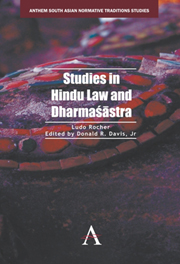Book contents
- Frontmatter
- Contents
- Foreword by Richard W. Lariviere
- Preface
- Abbreviations
- Note on the Edition
- Introduction
- PART ONE THE NATURE OF HINDU LAW
- PART TWO GENERAL TOPICS OF HINDU LAW
- Ancient Hindu Criminal Law
- Hindu Law of Succession: From the Śāstras to Modern Law
- Caste and Occupation in Classical India: The Normative Texts
- Megasthenes on Indian Lawbooks
- The “Ambassador” in Ancient India
- The Status of Minors according to Classical Hindu Law
- Quandoque bonus dormitat Jīmūtavūhanas?
- Notes on Mixed Castes in Classical India
- Inheritance and Srāddha: The Principle of “Spiritual Benefit”
- The Theory of Matrimonial Causes According to the Dharmaśāstra
- Jīmūtavūhana's Dāyabhāga and the Maxim Factum Valet
- The Divinity of Royal Power in Ancient India according to Dharmaśāstra
- A Few Considerations on Monocracy in Ancient India
- PART THREE HINDU LEGAL PROCEDURE
- PART FOUR TECHNICAL STUDIES OF HINDU LAW
- PART FIVE ANGLO-HINDU AND CUSTOMARY LAW
- Bibliography
- Index
Caste and Occupation in Classical India: The Normative Texts
from PART TWO - GENERAL TOPICS OF HINDU LAW
Published online by Cambridge University Press: 05 February 2013
- Frontmatter
- Contents
- Foreword by Richard W. Lariviere
- Preface
- Abbreviations
- Note on the Edition
- Introduction
- PART ONE THE NATURE OF HINDU LAW
- PART TWO GENERAL TOPICS OF HINDU LAW
- Ancient Hindu Criminal Law
- Hindu Law of Succession: From the Śāstras to Modern Law
- Caste and Occupation in Classical India: The Normative Texts
- Megasthenes on Indian Lawbooks
- The “Ambassador” in Ancient India
- The Status of Minors according to Classical Hindu Law
- Quandoque bonus dormitat Jīmūtavūhanas?
- Notes on Mixed Castes in Classical India
- Inheritance and Srāddha: The Principle of “Spiritual Benefit”
- The Theory of Matrimonial Causes According to the Dharmaśāstra
- Jīmūtavūhana's Dāyabhāga and the Maxim Factum Valet
- The Divinity of Royal Power in Ancient India according to Dharmaśāstra
- A Few Considerations on Monocracy in Ancient India
- PART THREE HINDU LEGAL PROCEDURE
- PART FOUR TECHNICAL STUDIES OF HINDU LAW
- PART FIVE ANGLO-HINDU AND CUSTOMARY LAW
- Bibliography
- Index
Summary
This is a general study of the relation between caste and occupation according to the normative texts of ancient India. The sources on which this study is based are not new. All Sanskrit texts that will be quoted in this paper are available in English translations which have been read —and relied on— by several generations of scholars. Yet, to understand fully the Sanskrit sources, existing translations not only often prove inadequate; they are in many cases misleading. I shall, therefore, present my own translations for all sources, and supplement them with a commentary whenever necessary.
I shall throughout this paper use the word “caste” to translate the Sanskrit term varṇa. Even though this translation is inadequate, any other English equivalent —which would necessarily amount to a lengthy circumlocution— would make the translations from Sanskrit unnecessarily cumbersome.
I shall distinguish between two sets of norms: the strict norm and the pliable norm. This distinction is not made by the texts, at least not explicitly. Yet, it is clear that the authors envisage a twofold situation: the normal situation, in which the strict norm applies, and the —less desirable— abnormal circumstance, which requires the replacement of the strict norm by the pliable norm.
The Strict Norm
Several texts describe the way in which the creator of the universe assigned different occupations to the members of the four castes. The Manusmṛti alone exhibits two similar passages on this subject: one in the first chapter, on creation (1.87–91), and one in the tenth chapter, on caste (10.74–131).
- Type
- Chapter
- Information
- Studies in Hindu Law and Dharmasastra , pp. 201 - 214Publisher: Anthem PressPrint publication year: 2012



